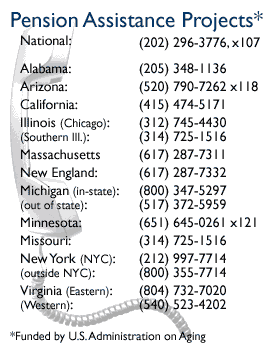|
When pension plans die
|
 |
March 27, 2000: 6:22 a.m. ET
It doesn't have to be the end of the world, but you should know your choices
By Staff Writer Jeanne Sahadi
|
NEW YORK (CNNfn) - If you're lucky enough to be among the more than 40 million Americans with an old-fashioned pension coming to them, that money probably figures prominently in your retirement equation.
But the truth is a company can terminate a defined-benefit plan at anytime, and if yours does you might need to rework your calculations.
Just because a plan dies doesn't necessarily mean you won't get paid what you are owed up until that point -- the Employee Retirement Income Security Act of 1974 (ERISA) helped see to that. But you may not always get as much as you thought, or you may get it a lot earlier than you expect.
And if a company you used to work for goes out of business or is sold, you must be vigilant about keeping the plan administrator up-to-date on how to reach you so you can get your due.
Why plans end
An employer may end its pension plan if it is financially hard-pressed, or if, for business purposes, it does not want to continue the plan, according to the Pension Benefits Guaranty Corp., a federal agency created by ERISA that insures the pensions of 33 million people in single-employer, defined-benefit plans.
 An insured plan may also get the ax if PBGC decides the pension doesn't have enough money to pay participants. An insured plan may also get the ax if PBGC decides the pension doesn't have enough money to pay participants.
Whatever the circumstance, participants should be notified in writing by either the plan administrator 60 days before the termination date or by the PBGC as soon as possible after it has taken control of a plan.
Getting your due
Of course, in the best and most common circumstances, a company ending its plan has ample funds to pay employees their pensions, and will do so by purchasing an annuity on your behalf, or possibly paying it to you in a lump-sum. Either way, the money will no longer be insured by PBGC.
If an annuity is purchased, you will receive your payments directly from the insurance company when you retire.
But there are times when that PBGC insurance comes in handy.
If a company files for what's called a "distress termination," the PBGC will take over as trustee and calculate your benefits according to the plan's provisions, but only up to ERISA limits. In 2000, the maximum benefit guarantee is $38,659.08 per year, or $3,221.59 a month.
That means if you had a high salary and would have been entitled to benefits above that amount, you stand to lose some money.
 "The better your benefit, the less protection you have," said Karen Ferguson, director of the Pension Rights Center in Washington. "The better your benefit, the less protection you have," said Karen Ferguson, director of the Pension Rights Center in Washington.
But the PBGC reports that the majority of participants in the plans it takes over receive all the money they would have gotten if their plans had not failed.
"In general terms, it's typically very few people who are over the limit," a PBGC spokesman said.
But be aware that the agency is in the business of covering basic pension benefits. ERISA does not necessarily require PBGC to compensate for special elements or recent improvements in your plan.
"They don't guarantee most bells and whistles," said Carol Connor Flowe, PBGC's former general counsel.
Not happy with your check?
But as with anything actuarial and bureaucratic, you may disagree with PBGC's assessment of how much you should receive. If that's the case, you can appeal your case with the agency.
 Figuring out the best strategy can be tough. "There is nobody to help you get through the process," Ferguson said. Figuring out the best strategy can be tough. "There is nobody to help you get through the process," Ferguson said.
What's more, said Mike Tanner, "It's very hard to understand the actuarial process to argue the point."
Tanner, whose name was changed to protect his privacy, is appealing a PBGC decision, contending that his monthly pension should be several hundred dollars more than it is.
But there are some resources to call on if you need help with your appeal or with understanding your rights.
Start with one of the pension assistance projects across the country. They have experts on staff who can offer advice and put you in touch with pension lawyers.
The lump-sum conundrum
You might also want help with the investment decisions you must make after a plan terminates.
If your plan is amply funded, in addition to an annuity, you may be given the option to roll the money over into an IRA or take it as a cash payout. And if your company is sold or merged, you may be able to roll the money over into the new company's pension plan.
Be warned, however. If you choose the cash payout you pay income tax on it and, if you are under 59-1/2, a 10 percent withdrawal penalty as well, said certified financial planner Ray Ferrara of Clearwater, Fla.
Translation: Don't cash out.
The only people who don't have to pay the penalty, Ferrara said, are those 55 and older who have been terminated from their positions when the pension plan ends.
Other investment choices
If you are choosing between an annuity and an IRA, consider your health.
Having dinner with your great-grandmother? "You might want to take an annuity if you have super longevity in your family," Ferrara said. Depending on how you set them up, annuities can offer guaranteed payments until your death.
But if you have a progressive disease or are otherwise in poor condition, an IRA may be a better place to park your money, he advised.
Investment savvy is another factor. "If you are not astute in managing money, are not comfortable working with a financial planner, and are concerned about the market, taking an annuity may give you greater peace of mind," Ferrara said.
But if you are confident making investment decisions, an IRA may serve you well.
If you or your money's gone missing
Of course, there's no point worrying how to invest your money if you can't find it or if you're not on record as a plan participant. There's at least $19 million in pension benefits out there that could have your name on them.
If you're a missing pensioner or are trying to locate your pension from a company that has closed its doors, be sure to check PBGC's pension search directory. 
|
|
|
|
|
 |

|

